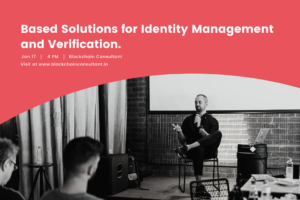Blockchain technology is changing the way businesses operate, and enterprise blockchain is at the forefront of this shift. It’s a distributed ledger technology that allows businesses to securely keep track of all transactions, contracts, and other data, without the need for intermediaries.
However, implementing blockchain technology in a business setting can be complex, requiring knowledge of distributed systems, cryptography, and security. This is where blockchain consulting comes in.
In this article, we will explore the basics of enterprise blockchain and how blockchain consulting can help your business leverage this technology.
At the end of this article, you will learn:
- The Basics of Enterprise Blockchain
- Key considerations of implementing enterprise blockchain.
- How can blockchain consulting help businesses?
- Why should you choose Blockchainconsulting.io for your business?
Now, before going to the main part of this article, first understand the enterprise blockchain.
What Is Enterprise Blockchain?
Enterprise blockchain refers to the use of blockchain technology for businesses and organizations. It involves the implementation of blockchain in various processes. It can be used in supply chain management, finance, and smart contracts. It is used to increase transparency, security, and efficiency. Unlike public blockchains that are open to everyone, enterprise blockchains are permissioned, meaning that access is limited to authorized participants. Enterprise blockchains typically require robust governance mechanisms to ensure that they adhere to regulatory requirements and corporate policies.
Understand The Basics of Enterprise Blockchain
Enterprise blockchain platforms offer a number of features that make them especially well-suited for use in business environments. These include:
- Scalability: Enterprise blockchains are designed to handle large volumes of data, transactions, and users.
- Security: Enterprise blockchains are highly secure, with multiple layers of cryptographic protection.
- Consensus mechanism: Enterprise blockchains use a consensus mechanism to validate transactions and prevent fraud.
- Smart contracts: Enterprise blockchains can be used to execute smart contracts, which are self-executing contracts that automatically enforce the terms of an agreement.
Advantages of Enterprise Blockchain for Businesses:
Enterprise blockchain offers a number of benefits for businesses, including:
- Increased efficiency: Blockchain can automate and streamline business processes, reducing the time and resources needed to execute transactions.
- Lower costs: By reducing the need for intermediaries and automating processes, blockchain can lower transaction costs for businesses.
- Improved transparency: Blockchain provides a tamper-proof record of transactions, which can improve transparency and accountability.
- Enhanced security: With its multiple layers of cryptographic protection, blockchain can provide businesses with a high level of security for their data and transactions.
Key Considerations When Implementing Enterprise Blockchain
Implementing an enterprise blockchain solution can bring numerous benefits to an organization. However, it can also present several challenges that must be taken into consideration for effective adoption. Here are the key considerations to keep in mind when implementing enterprise blockchain.
Security and privacy concerns
One of the most critical considerations when it comes to blockchain implementation is security. As a decentralized distributed ledger, blockchain is considered secure, transparent, and tamper-proof.
However, hackers and malicious actors are constantly looking for vulnerabilities to exploit. Therefore, implementing robust security measures such as data encryption, private key management, multi-factor authentication, access control, and auditing is essential to ensure the privacy and integrity of the blockchain.
Additionally, organizations must also comply with data protection regulations, such as the General Data Protection Regulation (GDPR), to prevent data breaches and safeguard user information.
Regulatory compliance
Another key consideration when it comes to enterprise blockchain implementation is regulatory compliance. Many industries, such as finance and healthcare, are heavily regulated, and organizations must comply with various rules and regulations to avoid legal and reputational risks.
Blockchain solutions should be designed to comply with existing regulatory frameworks and standards, such as Anti-Money Laundering (AML), Know Your Customer (KYC), and the Health Insurance Portability and Accountability Act (HIPAA).
Integration with existing systems
Integrating blockchain with existing systems is crucial for successful adoption. Organizations must identify the right blockchain platform that can integrate with their existing systems and technologies seamlessly.
It means that blockchain implementation needs to be compatible with existing IT infrastructure, such as enterprise resource planning (ERP) systems, customer relationship management (CRM) software, and other databases. Additionally, integrating blockchain with existing systems can also reduce implementation costs and accelerate the adoption of the technology.
Scalability and performance
Scalability and performance are other critical factors to be considered when implementing an enterprise blockchain solution. Organizations must choose a blockchain platform that can scale to accommodate increasing transaction volumes without compromising performance.
Blockchain platforms should have the capability to handle high transaction throughput, low latency, and high availability of network resources. Moreover, the architecture of the system should have a balance between decentralization and efficiency, enabling high-velocity transactions while maintaining the security, trust, and transparency of the network.
How Blockchain Consulting Can Help Businesses?
- Understanding the Technology: Blockchain is a complex technology that requires a deep understanding of the underlying principles to develop a suitable use case. Blockchain consultants can help businesses understand the technology, its capabilities, and its limitations.
- Identifying Opportunities: Blockchain consultants can help businesses identify potential opportunities for blockchain implementation. They can analyze the business model, the industry, and the market to identify areas where blockchain technology can add value.
- Developing a Strategy: Blockchain consulting can help businesses develop a comprehensive strategy for implementing blockchain. This involves identifying the right blockchain platform, developing the right use case, designing the architecture, and integrating the blockchain into existing systems.
- Security & Compliance: Blockchain consultants can help businesses ensure the security and compliance of their blockchain implementations. They can help businesses understand the regulatory landscape and develop strategies to address cybersecurity and compliance risks.
- Training & Education: Blockchain consulting can help businesses train their employees on the technology. This includes educating staff on blockchain concepts, use cases, and best practices for implementation.
How Can Blockchainconsulting.io Help Businesses?
Blockchainconsultant.io can help you implement enterprise blockchain for your business. We can provide you with legal and technical consultancy to successfully scale the technology and maximize the ROI to bring great revenue. Contact us today to get tailored blockchain consultancy for your business.
Final Thought
Understanding the basics of enterprise blockchain is crucial for businesses to fully benefit from the technology’s capabilities. With the help of blockchain consulting services, companies can build a solid foundation in blockchain technology and navigate through the complexities of implementing it in their business processes. As the technology continues to evolve, businesses need to stay up-to-date on the latest developments and leverage the expertise of blockchain consulting services to harness the full potential of this game-changing technology.
















